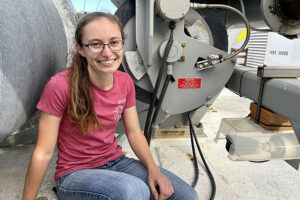BIOS’s Marine MacGyver

BIOS marine technician Lydia Sgouros received the “MacGyver Award” at the annual University-National Oceanographic Laboratory System (UNOLS) Research Vessel Technical Enhancement Committee (RVTEC) meeting. The “MacGyver Award” is a contest among marine technicians for ingenious solutions to technical issues that arise at sea, solved using only the materials available on board the ship, with RVTEC meeting attendees voting for their favorite submission. Sgouros won for building a new “payout sensor” for the CTD winch, which helps technicians keep track of how much cable has gone out along with the oceanographic instrument. While the original factory sensor failed within a week, Sgouros’ replacement has been going strong for seven months and counting.
Each year, the University-National Oceanographic Laboratory System (UNOLS), which coordinates and serves the U.S. Academic Research Fleet—including the BIOS-operated research vessel Atlantic Explorer—holds a meeting for all of the ships’ technical support groups. The RVTEC (Research Vessel Technical Enhancement Committee) meetings provide a forum for discussions about best practices and “foster activities that enhance technical support for sea-going scientific programs.”
The annual gatherings are also an opportunity to highlight the dedication of marine technicians who work long hours, often in the dark and while dealing with inclement weather, to ensure the success of ship-based research programs.
A creative way the RVTEC meetings do this is through the “MacGyver award,” a contest where technicians are encouraged to submit their most ingenious solutions to technical issues that arise at sea using only materials available on board the ship. RVTEC meeting attendees vote for their favorite submission.
“Research vessel technicians are the most ingenious individuals I know,” said Brandy Murphy, UNOLS technical services manager at the University of Washington. “The ‘MacGyver award’ is a great opportunity to highlight that ingenuity under pressure and with limited resources while also exchanging information and sharing lessons learned. The U.S Academic Research Fleet is lucky to have talented individuals like Lydia as a part of our team.”
This year, during the 2022 RVTEC meeting, BIOS marine technician Lydia Sgouros received the “MacGyver award” for engineering a replacement sensor for a winch aboard Atlantic Explorer after the original part failed within a week of operation.
Sgouros explained that a new winch for the CTD was installed on Atlantic Explorer in March 2022. The CTD is a key oceanographic instrument that measures the conductivity, temperature, and depth of sea water, as well as other water quality properties, providing valuable data for ocean profiles and time-series studies. One of the sensors on the winch is a “payout sensor” or “encoder” which helps technicians like Sgouros keep an eye on how much cable has gone out and how deep the CTD is.
When the original encoder failed at-sea, Sgouros put her background in mechanical engineering and machine building to work.
“I put together a new ‘encoder’ within two or three days using a couple of proximity sensors, which were spares from another winch, and sheet metal cutouts,” she said. “A replacement sensor arrived a few weeks later and again failed within a week, but my sensor is doing great and is still going strong after seven months of operation.” Plans are in place to upgrade the sheet metal and sensor mounting used in Sgouros’ sensor.
Sgouros was in the middle of the Gulf Stream aboard Atlantic Explorer when the 2022 RVTEC meeting took place in early November so, while she was able to participate virtually, she was unable to accept the “MacGyver award” in person. The UNOLS-RVTEC team will be sending her an engraved Leatherman multi-tool in recognition of her award.
